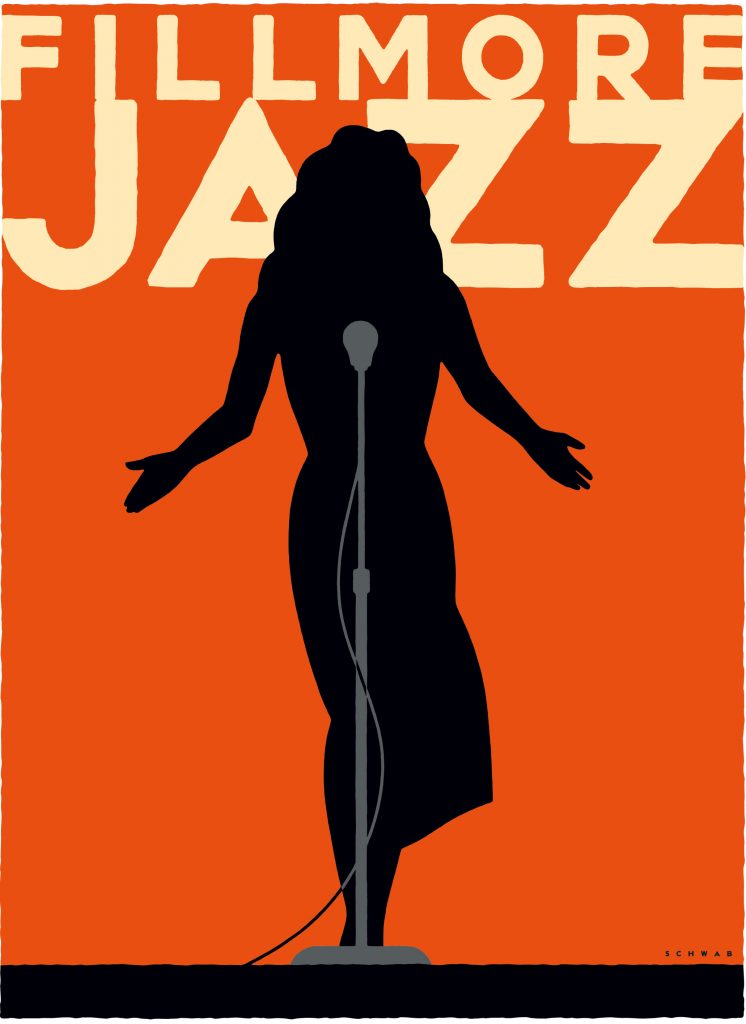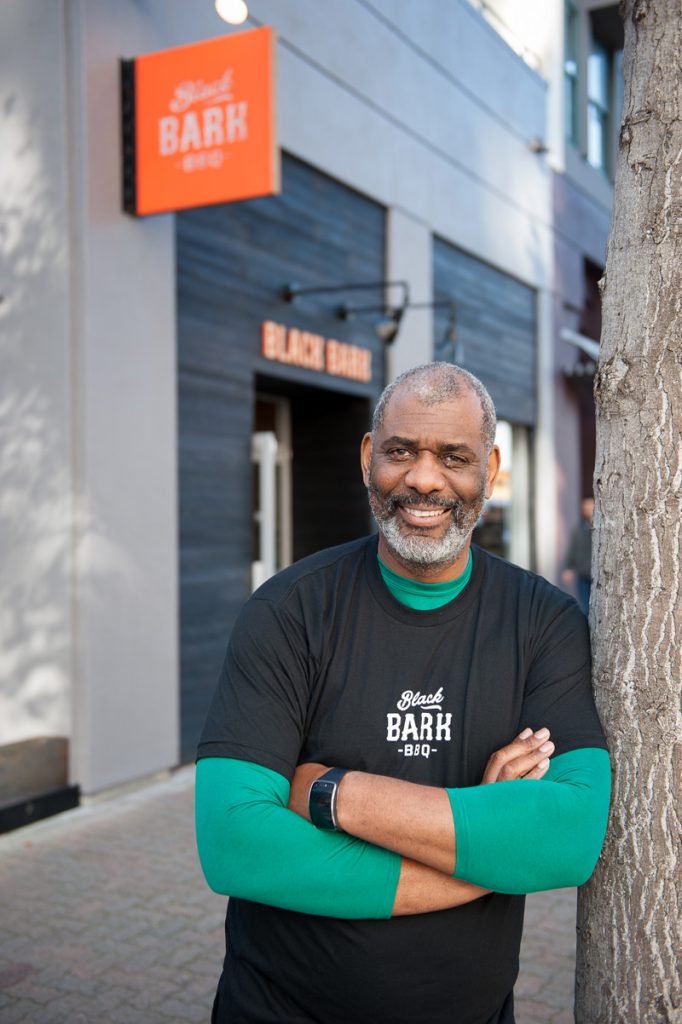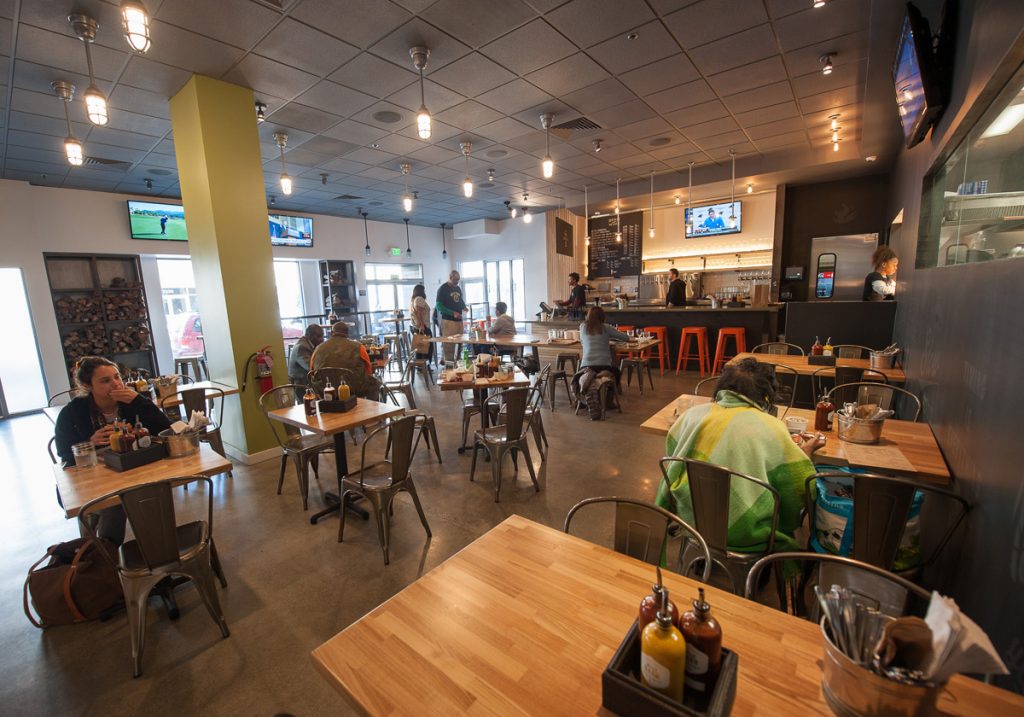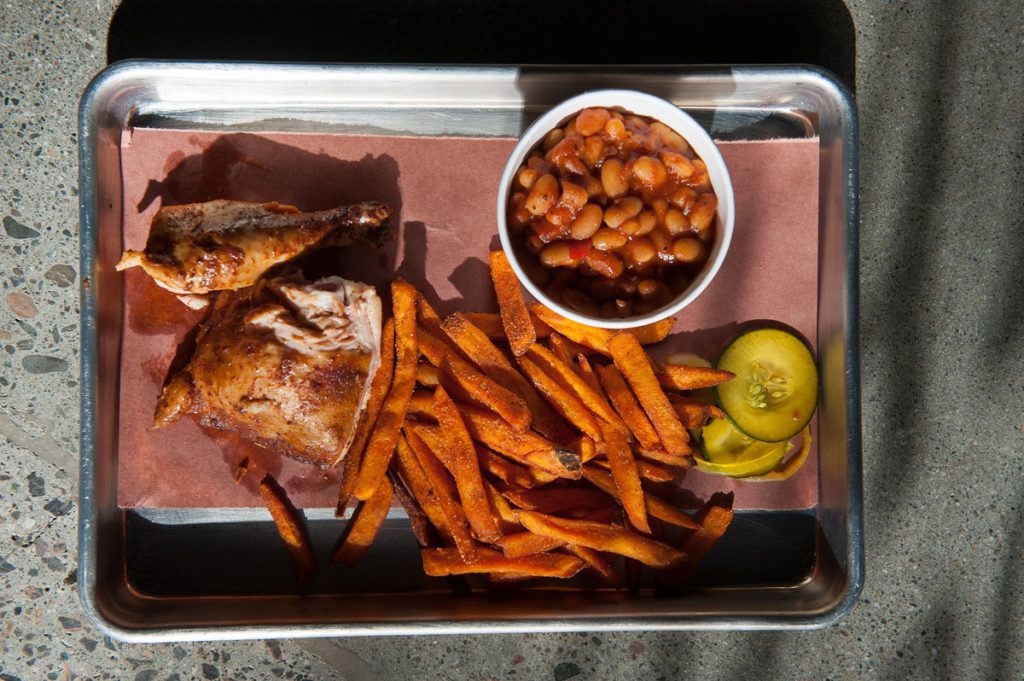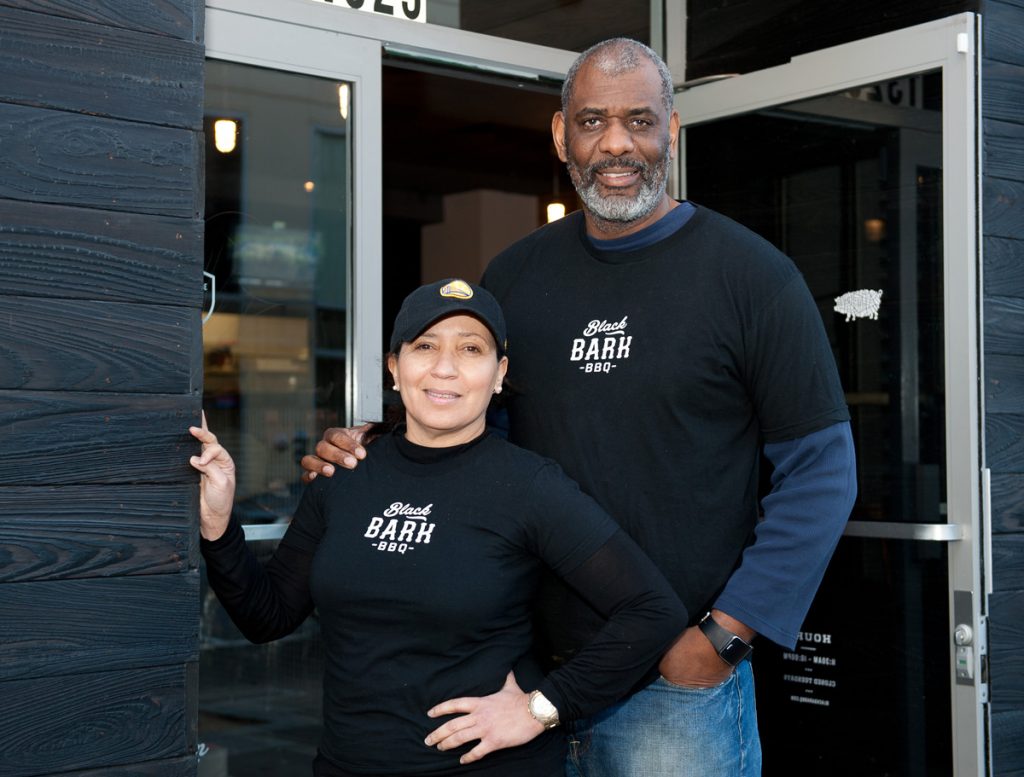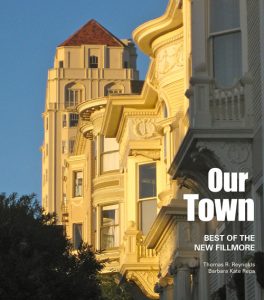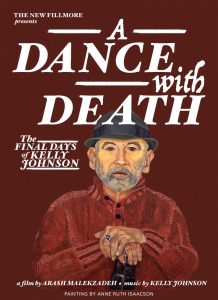By BARBARA KATE REPA
When David Lawrence and Monetta White announced plans to open their high end but homey restaurant, 1300 on Fillmore, eight years ago, friends cautioned against it. “They said, ‘You’re going down to lower Fillmore? Are you nuts?’ ” says White, whose mother and grandmother both grew up in the neighborhood.
But soon after the doors opened, the joint was jumping, fueled by foot traffic brought in by the adjacent Yoshi’s restaurant and jazz club. The club was part of the Fillmore Heritage Center — a 240,000-square-foot mixed-use complex that included Yoshi’s, 1300 on Fillmore and a nonprofit art gallery, with 80 condominiums rising above — all constructed in an ambitious attempt to revitalize Fillmore south of Geary.
For a few years, the $75 million bet seemed to pay off, as the new businesses and residents brought a vibrancy, unity and goodwill to the nascent jazz district, along with new patrons and customers. Then suddenly things changed. Fingers pointed at various culprits: a lagging economy, changing neighborhood demographics, bad management, the new SF Jazz Center in the Civic Center. The Lush Life Gallery closed first. Then Yoshi’s declared bankruptcy. An attempt to revive the club as The Addition quickly failed. For the last year, it has sat empty — an eerily silent space nearly a block long. Many people assumed 1300 on Fillmore was no longer in business, either.
“We were part of that team that put the whole deal together — and that wasn’t what we signed up for,” says Lawrence, nodding to the vacant venue. “But Monetta and I wanted to keep it open, so we persevered.” They cut back hours so that 1300 is no longer open on Mondays and sometimes pulled a curtain to make a smaller dining area.
“1300 is our first love and it means a lot to us. We’ll never let it go,” says Lawrence. “It’s where we began and will always be an extension of us. In fact, I foresee other 1300s in the future, perhaps in other cities.”
He acknowledges the city of San Francisco has also helped keep 1300 open, posting a prominent sign on the shuttered Heritage Center that makes clear 1300 is open and giving them a break on the rent.
Far from being cowed, now they’ve doubled down, opening Black Bark, a barbeque restaurant, just across the street at 1325 Fillmore.
Mayor Ed Lee was among those at the ribbon cutting ceremony for Black Bark on January 12, the day before it opened to the public. “I’m here because I love barbeque. But I also realize that on Fillmore, it’s hard to start a business,” Lee told the crowd of friends and fans, before singling out White and Lawrence for praise. “They are the key to the revitalization of the Fillmore. It’s because of their passion there is new interest in revitalizing the Fillmore Heritage Center,” he said, ending with a hopeful prediction: “It’s just going to get better.”
The name of the new spot, Black Bark, comes from the nickname for the surface of brisket, darkening as it’s slowly smoked. “It gets crispy, crunchy — beautiful,” says Lawrence. The menu features smoked meats by the half pound — beef brisket, pulled pork, link sausage, spare ribs, chicken and turkey legs — along with sides, salads, sandwiches and sweets. Draft beers are listed as ranging in intensity from “lighter” to “big flavors and strong.” There are also six wines on tap: three reds, three whites. And sweet tea, of course, plus lemonade that strikes the perfect balance between sweet and tart.
The look and feel of Black Bark is clean and spare, but welcoming. Lawrence says he wanted to convey the feeling of “an updated barbeque place” much in the way pop culture updates childhood memories and icons. “Look at how they’ve modernized James Bond,” he says. “That was my vision for this place: familiar, but modern.”
Seating is at a few hightops and counter seats, plus two-tops, four-seaters and a long communal picnic table. Soon to be added: outdoor seating with lights, heaters and hedges near the front door. Saucy sayings are stenciled on the walls, including “Every Butt Loves a Rub,” “Killer Racks on Fillmore” and “Beer and Swine.”
There are ubiquitous televisions mounted on the walls throughout the place. “I wanted TVs because it’s a local place — and so folks don’t have to go all the way up to Harry’s to watch a big game,” Lawrence says.
The local vibe is real. Lawrence greets neighbors and friends who enter, and customers cluster and chat. Half of the employees live in the Western Addition and Lawrence and White have known many of them since they were kids. Part of their pledge of giving back is to host trainings for young people who may be interested in the restaurant business. A “front of the house” training is slated for February 16.
“Our industry is lacking in manpower,” Lawrence says. “Lots of kids don’t realize they can make a livelihood in restaurant work. I like to showcase what I do to let them know it’s a possibility.”
The seeds of this new neighborhood barbeque joint were planted years ago when Lawrence was convinced, against his will, to add barbequed ribs to the menu at 1300. They quickly sold out most nights.
“At 1300 we had baby backs; they’re more refined,” says Lawrence. “Here at Black Bark we have spareribs, which offer bigger cuts of meat.”
He also was taken by the need to fill a void. Longtime neighborhood institution Leon’s Bar-B-Q — the last of the Fillmore ’cue joints — closed not long after proprietor Leon McHenry’s death in 1999. A sidewalk plaque near Black Bark commemorates Kansas City Hickory Pit Bar-B-Que, formerly at 1335 Fillmore.
“I waited five years for this place — watching the space. And now it’s starting to happen,” says Lawrence,
underscoring that he’s no stranger to waiting, since it took 17 years for him to get a green card when he moved to the U.S. from his native London.
But first, there was some painstaking research to get it right. He confided his plan to bring barbeque back to the neighborhood to Michael Cheadle, whose music group Future Perfect serves up songs most Sundays during Gospel Brunch at 1300 on Fillmore. Lawrence says Cheadle told him: “Well, when you do that barbeque place, my mom would like to help you out.”
Edith Cheadle, along with her husband, operated a barbeque restaurant in Dallas for the last 15 years. Since her own children were more interested in making music than food, she was happy to adopt Lawrence as her barbeque heir apparent. She came out for a couple of months before Black Bark opened — even divulging the secrets of her sweet potato pecan casserole, coleslaw and spice rubs for the meats. And she has returned periodically to make sure the lessons are remembered.
Another friend introduced Lawrence to his brother, Kevin Bludso, who owns the acclaimed Texas-syle barbeque eatery bearing his name in Compton. “There’s just one place in California that has good barbeque — and that’s Bludso’s,” he and White were told. So Lawrence went to work there for a week, taking in the nuances of spicing and smoking the meat to get the best barbeque.
And he confesses he couldn’t resist practicing the newfound skills on his own — setting up a little Smokey Joe grill at a friend’s house, where the two experimented with smoking various meats from midnight until mid-morning. Beer was also involved.
“My thing was to do it Texas-style, without the sauce,” he says. “It’s more about the good quality of meat, the seasonings, the flavorings — that’s what comes through.” Black Bark sought out family-owned Brandt Beef, which helped pioneer the practice of raising cattle without antibiotics or hormones.
Still, the sauces have not been overlooked. Tables at Black Bark are set with an offering of three sauces painstakingly developed at 1300 over the last several years: California Gold featuring mustard, House BBQ and Vinegar. More varieties are in the works, including a mayo-based Alabama White for summer.
So far, Lawrence’s biggest love — and challenge — is brisket. “It’s the hardest thing to cook. The meat is in all different shapes and sizes; people don’t realize that,” he says. “It needs babying, attention, love. You want it to have that jelly effect when it’s done just right.”
“Quite a few people have been looking for a place like this,” Lawrence says, smiling broadly as the restaurant fills with customers during off-hours on a recent afternoon. He proudly mentions that on the first day, Black Bark sold out in 2½ hours; the next day, they quadrupled the meat order.
And he’s unmoved by some of the handwringing over recent changes in the neighborhood. “Fillmore is changing — for the good,” he says, noting the presence of the acclaimed State Bird Provisions and its sister restaurant, the Progress, just up the street. He’s also anticipating the opening of Wise Sons Bagel nearby, so he can start the day with a fresh bagel and a cup of tea.
“We’re invested in the neighborhood,” Lawrence says. “We have a condo right here, and we really love what we do. If you’re in the food business, this is what you wish for: two restaurants.”
He suggested that might not be enough.
“We’re looking at doing another one soon — might as well go for it,” he says, adding that it was sad Gussie’s Chicken and Waffles, just around the corner, closed in 2014. “I want to be able to walk down here and not see empty shop windows,” Lawrence says with a suggestive smile. “We might have a hand in that.”
That would be tripling down.
UPDATE: 1300 on Fillmore opening at SFO
EARLIER:
Harlem nights meet Pacific Heights
1300: a saloon with a soul
Filed under: Food, Drink & Lodging, Locals


